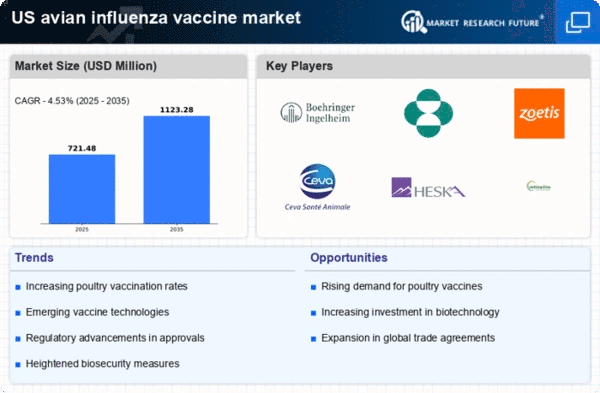The US Avian Influenza Vaccine Market operates within a highly specialized environment, characterized by the need to address the threats posed by highly pathogenic avian influenza viruses. Competitive dynamics in this market are shaped by regulatory compliance, advances in vaccine technology, and the strategies adopted by key players to maintain product efficacy while minimizing production costs. As the prevalence of avian influenza outbreaks can lead to severe economic impacts within the poultry industry, vaccine manufacturers strive to innovate and differentiate their offerings.
The competition is marked by a focus on research and development, partnerships with governmental and health organizations, and the implementation of robust supply chain strategies to ensure timely delivery of vaccines, even during outbreaks. Companies operating in this market must also navigate compliance with stringent regulatory frameworks set forth by entities such as the USDA and FDA, which further complicates the competitive landscape.
Hyglos has established a notable presence in the US Avian Influenza Vaccine Market, leveraging its expertise in biopharmaceuticals to develop innovative vaccine solutions. The company is recognized for its strengths in highly effective vaccine formulations that cater to poultry-specific strains of avian influenza. Hyglos has invested significantly in research and development, positioning itself as a leader in vaccine innovation while ensuring compliance with regulatory standards. Their strong focus on quality control and batch consistency enhances their reputation within the market.
Additionally, the company emphasizes strategic collaborations with industry stakeholders and research institutions, which allows for the advancement of vaccination strategies and improved disease control measures, ultimately solidifying their competitive edge in the marketplace.
Merial, a prominent player in the US Avian Influenza Vaccine Market, is well-regarded for its extensive portfolio of veterinary vaccines, including those specifically designed to combat avian influenza. Offering a range of key products, Merial combines innovative technology with a commitment to animal health, thereby ensuring effective vaccination solutions that address industry needs. Their strong market presence is bolstered by a robust distribution network and strong relationships with poultry producers, which facilitate widespread access to their products. Merial's strengths lie in its ongoing focus on research and development, resulting in vaccines that are responsive to emerging viral threats.
The company has also pursued strategic mergers and acquisitions to enhance its capabilities and expand its product offerings within the avian market. These initiatives have allowed Merial to solidify its status as a trusted provider in the US Avian Influenza Vaccine Market, ensuring they remain competitive in an evolving landscape.




















